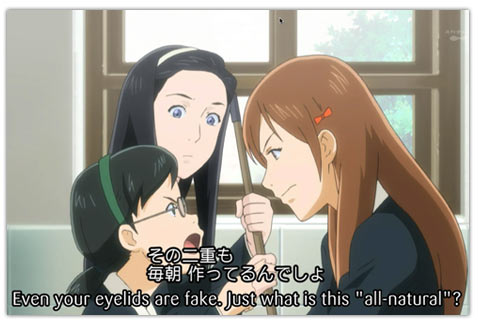We’re having a bit of a “Korea Boom” in my house right now, courtesy of my wife. Like millions of other Japanese women, she’s decided that Korean dramas are the neatest thing since sliced sashimi, and has been watching them on Japanese TV and rented DVD almost every night. (She even has a calendar of handsome actor Hyun Bin in her office.) When I ask her what’s so interesting about the shows, she gets very animated. “Oh, they’re nothing like Japanese dramas,” she says. “They’re more intense, and the characters are deeper and more interesting. I can always guess how Japanese dramas will end, so they’re boring.” I’ve often thought that her love of Korean dramas was a lot like my own feelings for Japanese animation — she even complains when she has to watch them dubbed instead of with subtitles, just like me when watching anime. My theory is that the brain has a fundamental craving for the fresh and unique, and when something fills this need for an “other-ness” it’s hard to resist embracing it. Supposedly Korean dramas remind Japanese of the good old days of the Showa Period, which may be why so many fans in Japan are in their 40s and older.
I decided to check out the anime version of the Korean drama Winter Sonata, which was interesting on several levels. It was a long time since I’d needed to pay attention to subtitles in anime, but since I was watching it in the Korean language, my eyes needed to stay glued to the TV if I was to understand the story. I found I’d been taking my knowledge of Japanese cultural iconery for granted, and parts of the anime were difficult for me to identify easily, since it was different from Japan. There were other cultural differences, too, like a scene in which a high school girl berates another for pretending to be a natural beauty even though she’d had plastic surgery, which would be unthinkable in Japan. As with watching the Korean-language scenes in Lost, it was fun to try to pick out the tiny smattering of words that are the same in Japanese, like yakusoku (promise), heikin (average) or kando (to be moved emotionally by something).

Korean anime presents new cultural learning experiences; my wife has also started serving kimchee with every meal.














